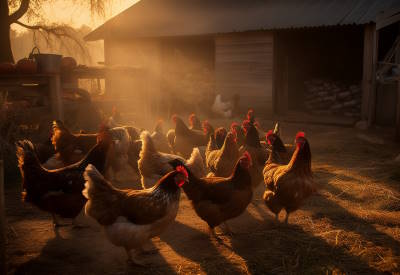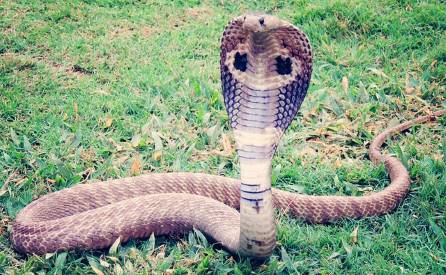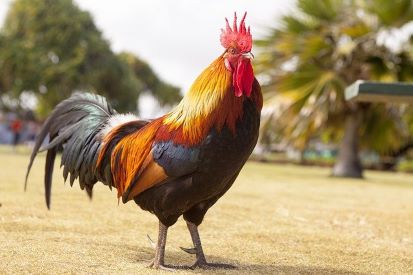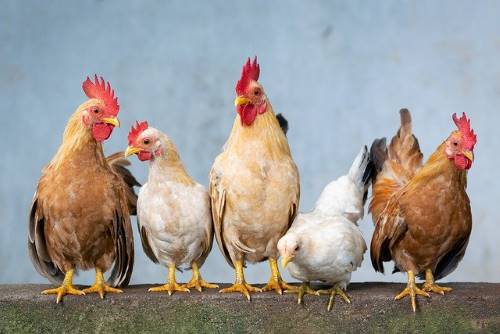You might have heard all sorts of tales about what chickens eat. From bugs to bread crumbs, these birds aren’t known for being choosy. But when I heard the claim chickens eat snakes, I was taken aback. It seemed too wild, even for the eclectic dietary habits of chickens. After digging into the facts, this statement isn’t as outlandish as it first appears. So, let’s unravel this surprising poultry query: do chickens eat snakes?
Yes, as mind-boggling as it might seem, chickens can, and sometimes do, eat snakes. It’s not a regular meal or an intentional addition to their menu but more of an opportunistic act. Chickens are naturally omnivores, and their diet is far more diverse than many might realize.
This revelation intrigued me, spurring me to dive deeper into the topic. So, let’s embark on this fascinating journey together, exploring the ins and outs of a chicken’s diet, their surprising interaction with snakes, and the broader implications of their omnivorous feeding habits.

Understanding Chickens’ Diet: Omnivores By Nature
From the farmlands to backyard coops, one thing remains the same – chickens aren’t picky eaters. They’re natural omnivores, feasting on various foods to meet their dietary needs.
What is an Omnivore?
In the simplest terms, an omnivore is a creature that consumes both plants and animals. They’re the “jack of all trades” in the food chain, adapting to eat whatever they can get their beaks or teeth on, depending on the availability of food resources.
Chickens’ Dietary Preferences: A Glance
Our feathery friends love to gobble up everything from seeds, fruits, and vegetables to insects, worms, and even small rodents. This broad spectrum diet provides them the necessary nutrients to thrive and lay eggs.
Importance of Diversity in a Chicken’s Diet
Having a diverse diet is essential for chickens. It provides a balanced nutritional intake that supports their growth, immune system, and egg production. Without this diversity, their health could be compromised.
[ChickenAffiliate]
Chickens and Insects: The Usual Suspects
When we think about what chickens eat, insects are usually the first animals that come to mind. They’re an excellent source of protein and a natural part of a chicken’s diet.
Common Insects and Small Animals in a Chicken’s Diet
Chickens are quite adept at catching and eating a variety of bugs, including beetles, grasshoppers, and worms. These creepy crawlies are a chicken’s version of fast food, quick to catch and filled with protein!
Benefits of Insect Consumption for Chickens
Insects are packed with essential nutrients like proteins, which help chickens grow and develop healthy feathers. Plus, they’re a valuable source of entertainment, stimulating the chicken’s natural hunting instincts.
Chickens’ Hunting Behaviors and Skills
Chickens aren’t passive feeders. They’ll scratch, peck, and chase after their meals, showcasing an array of impressive, albeit comical, hunting behaviors.
The Unusual Culprit: Do Chickens Eat Snakes?

It may sound like a fable or an old farmer’s tale but believe it or not, chickens have been known to tussle with and consume snakes.
Instances of Chickens Eating Snakes: Fact or Myth?
Chickens eating snakes is more than just countryside hearsay. Numerous first-hand accounts and videos document this phenomenon, turning myth into reality.
Factors Influencing a Chicken’s Tendency to Eat Snakes
Various factors come into play here, including the size and species of the snake, the chicken’s breed and size, and its exposure and acclimatization to snakes.
Kinds of Snakes Chickens Are Most Likely to Encounter and Eat
Chickens are more likely to eat smaller snakes they can kill. Non-venomous varieties like garter snakes and small grass snakes often fall victim to hungry chickens.
Biological Feasibility: Can Chickens Digest Snakes?

You may wonder, even if a chicken eats a snake, can it digest it? The answer lies in understanding the chicken’s impressive digestive system.
Chicken’s Digestive System: An Overview
Chickens have a unique digestive system that allows them to consume a wide range of foods. Key to this is the gizzard, a specialized stomach that grinds hard food into digestible bits.
How Chickens Digest Hard-to-Digest Foods
The gizzard plays a vital role here. Chickens consume small rocks or grit, which stays in the gizzard. These stones grind down hard-to-digest foods, including small bones and, you guessed it, snakes!
The Process of a Chicken Digesting a Snake
First, the chicken’s beak tears the snake into manageable pieces. Then, the pieces make their way to the gizzard, where they’re ground down, aided by the previously ingested grit. It’s a tough process, but chickens are more than equipped to handle it.
Risks and Benefits: Analyzing Snake Consumption by Chickens

While it’s a fascinating spectacle, there are some considerations to consider when it comes to chickens eating snakes.
Nutritional Value of Snakes in a Chicken’s Diet
From a nutritional standpoint, snakes can offer a hefty dose of protein, similar to insects. However, they’re not a common or essential part of a chicken’s diet.
Risks Involved with Chickens Eating Snakes
The main risk lies in the potential for the snake to harm the chicken. Venomous snakes pose a significant threat, while larger non-venomous snakes can injure or kill chickens. Plus, there’s always the potential risk of disease transmission.
Possible Impacts on the Chicken’s Health and Behavior
A chicken consuming a snake may experience digestive issues, especially if the snake is large. Behaviorally, a successful snake hunt could encourage the chicken to pursue similar prey in the future.
Management Strategies: Minimizing Potential Harm

So, what’s a chicken keeper to do if their flock starts showing a taste for slithering serpents?
Importance of Managing a Chicken’s Diet
Maintaining a balanced and safe diet for your chickens is crucial. While they can eat a variety of foods, ensuring they get the right nutrients without exposing them to unnecessary risks is paramount.
Signs a Chicken Might Have Eaten a Snake: What to Look Out for
Watch out for signs like feathers around the mouth, unusual droppings, or changes in behavior. If you suspect your chicken has eaten a snake, monitoring its health closely in the following days is advised.
How to Discourage Chickens from Eating Snakes and Safer Alternatives to Snakes in their Diet
One effective way to discourage this behavior is limiting their exposure to snakes. Make your coop and run as snake-proof as possible. As for diet, providing a variety of safe protein sources like mealworms, crickets, and quality chicken feed can help keep them from seeking risky meals.
Further Snake Considerations for Chicken Keepers
Snake Predation on Chickens
While we’ve largely discussed the scenario where chickens eat snakes, the reverse can also be true. Larger snakes have been known to prey on chickens, especially chicks or smaller breeds. Chicken keepers in areas with larger snakes should ensure their coops and runs are secured against snake intruders to keep their flock safe.
Identifying Snake Species
For both the safety of the chickens and the snakes, it’s beneficial to familiarize yourself with the local snake species in your area. Understanding which snakes are venomous and which are harmless can help you assess the risk to your chickens and inform your response if you find a snake near your coop.
Reputation of Chickens as Snake Control
There’s a bit of a folk reputation for chickens being a form of natural snake control. While chickens can and do kill and eat snakes, they should not be relied upon as a primary method of controlling snake populations. Their safety and wellbeing should always come first.
Impact of Snake Diet on Egg Production
Finally, while it’s outside the realm of most studies, some anecdotal evidence suggests that a diet heavy in unusual protein sources like snakes may impact a chicken’s egg production or the taste of its eggs. However, this is largely speculative and would require further research to confirm.
What Else Do Chickens Eat Apart from Snakes?

While snakes may occasionally make the menu for our adventurous poultry, it’s fascinating (and sometimes a bit disconcerting) to realize what other unlikely foods chickens might sample. Let’s dive into some other unusual items chickens have been known to eat.
Mice
Believe it or not, a chicken won’t turn its beak up at a mouse if one happens to scurry by. The nutritional content of a mouse is quite high, providing a protein-packed meal for the bird. However, it’s not without risks. Mice can carry diseases that could potentially be transmitted to your chickens. It’s not a dietary choice to encourage.
Read More: Do Chickens Eat Mice? Unveiling The Surprising Truth
Scorpions
Now, this one might surprise you! Chickens have been seen eating scorpions, demonstrating their bravery and natural resilience to toxins. While scorpions could provide a decent source of protein, the danger involved isn’t worth it. There’s a risk of chickens being stung, which could be harmful or even lethal.
Read More: Do Chickens Eat Scorpions? An Unexpected Food Chain Link
Frogs
Frogs are another unexpected item on a chicken’s dietary roster. They’ll peck and consume small frogs if they get the chance. Frogs, like other small animals, are a good source of protein, but similar to the other creatures listed here, they can also pose a risk. Certain frogs may be toxic, so allowing your chickens to eat them is not advisable.
Read More: Do Chickens Eat Frogs? Unraveling The Surprising Truth
Lizards
Lizards might seem like a tough meal, but that doesn’t stop some chickens. As with the other critters we’ve discussed, lizards can provide a protein boost. However, there’s always a risk of disease or parasite transmission, so it’s safer to prevent chickens from eating these reptiles if possible.
Read More: Do Chickens Eat Lizards? Unveiling The Predator Side Of Poultry
Their Own Poop
This one is a bit gross, but it’s worth mentioning. Chickens may peck at their own poop out of curiosity or because they’ve spotted undigested food particles in it. While this may seem unhygienic, chickens have a robust digestive system that can handle many types of bacteria. Nonetheless, it’s not a good practice as it could lead to the spread of harmful pathogens. Ensuring a clean environment and a balanced diet can help discourage this behavior.
Read More: Do Chickens Eat Their Own Poop? Unearthing The Truth
Do chickens eat snakes – final thoughts
Well, there we have it, the wild and somewhat unexpected answer to our original question: do chickens eat snakes? From insects to greens and occasionally snakes, our plucky poultry friends aren’t ones to shy away from an unconventional meal. While it’s not an everyday occurrence, these feathered omnivores have been known to peck, prod, and ultimately ingest these slithering creatures when the opportunity arises.
However, as entertaining as the image of a chicken squaring off with a snake might be, it’s crucial for chicken owners to ensure our feathered charges are safe and well-fed without resorting to such risky meals. Keeping a watchful eye on their diet, environment, and health can help us keep things balanced. After all, a happy chicken makes for a happy coop!
